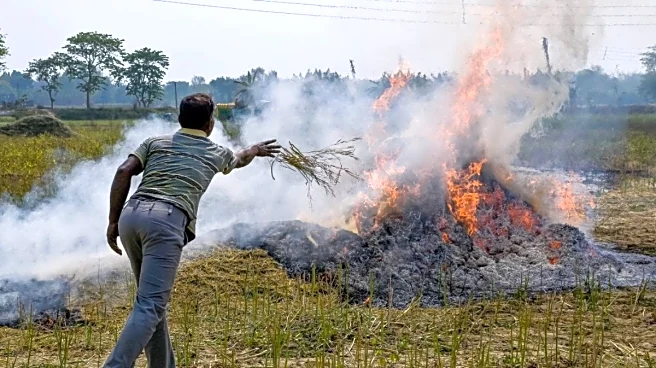The Commission for Air Quality Management in NCR and Adjoining Areas (CAQM) has reported a significant and encouraging decline in stubble-burning incidents across Punjab and Haryana, majorly contributing
to the volatile winter air pollution over the Delhi-National Capital Region. This reduction signals a potential breakthrough in years of efforts to curb farm fires.
According to data released by the CAQM for the period between September 15 and November 3, farm fire counts in Punjab fell to 2,518 this year, a nearly 40% reduction compared to 4,132 reported during the corresponding period in 2024. The achievement in Haryana is even more pronounced, with fire counts plummeting from 857 in 2024 to just 145 this year.
This sharp decline, particularly in Haryana, has been attributed to a combination of stringent enforcement actions and the successful promotion of Crop Residue Management (CRM) methods. Authorities have intensified monitoring, with the CAQM establishing a dedicated monitoring cell in Chandigarh and deploying 31 flying squads across Punjab and Haryana.
The enforcement drive has included:
Inspections: Over 2,161 fields inspected in Punjab and 121 in Haryana.
Penalties: Environmental compensation (EC) amounting to Rs 52.75 lakh imposed in Punjab and Rs 3 lakh in Haryana.
Legal Action: Nearly 946 First Information Reports (FIRs) filed in Punjab and 42 in Haryana under relevant sections of the Bharatiya Nyaya Sanhita, 2023, for violating the ban on agricultural waste burning.
The CAQM noted that this positive trend has coincided with a slight improvement in Delhi’s air quality, with the Air Quality Index (AQI) showing some localised reduction compared to the worst days of the season. However, anti-pollution measures under the Graded Response Action Plan (GRAP), including restrictions on non-Delhi-registered commercial goods vehicles, remain in effect across the NCR to combat other major sources of pollution.
Despite the overall reduction, experts caution that the fight is far from over. There remains an imperative to sustain efforts, especially through economic incentives and ex-situ utilisation plans (using stubble for biomass power or pellets), to ensure that the decline is permanent and not just a seasonal anomaly driven by aggressive enforcement.
(With PTI inputs)


/images/ppid_a911dc6a-image-177103853218557950.webp)





/images/ppid_a911dc6a-image-17710364781122582.webp)
/images/ppid_a911dc6a-image-177103642565816962.webp)
/images/ppid_a911dc6a-image-177103504309993710.webp)
/images/ppid_a911dc6a-image-177103508492594205.webp)


